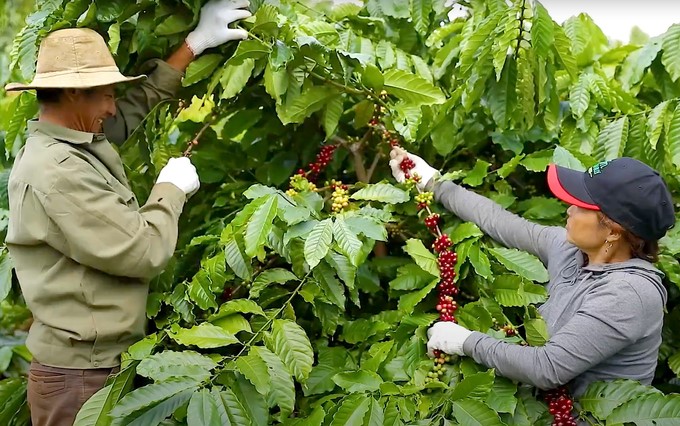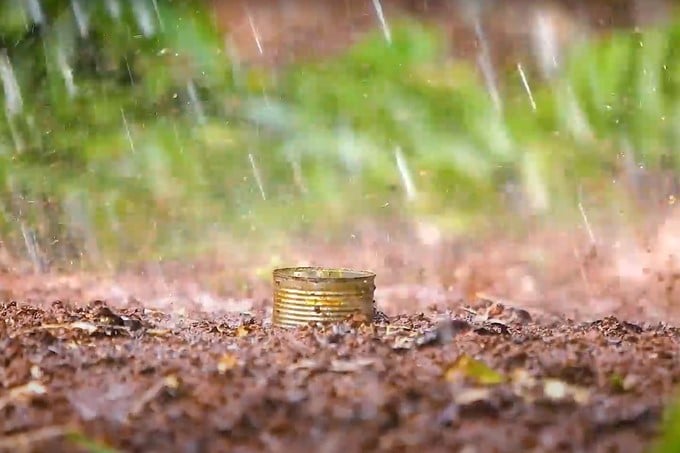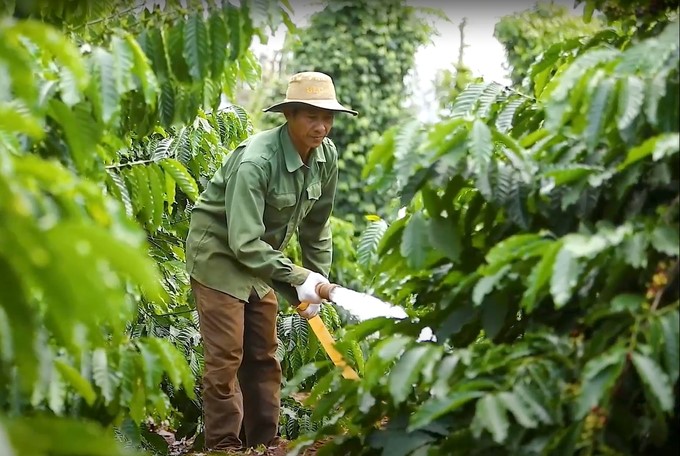May 21, 2025 | 13:39 GMT +7
May 21, 2025 | 13:39 GMT +7
Hotline: 0913.378.918
May 21, 2025 | 13:39 GMT +7
Hotline: 0913.378.918

A farmer household produces sustainable coffee under the NESCAFÉ Plan. Photo: Thanh Son.
Mr. Ly Thong Ha, leader of a farmer group in Di Linh town (Di Linh district, Lam Dong province), is one of the first people to participate in sustainable coffee production under the NESCAFÉ Plan since the program was deployed in Vietnam in 2011.
The group currently has 120 members with a total area of about 120 ha. The annual coffee output reaches about 800-900 tons. Looking back on 13 years of making sustainable coffee with the NESCAFÉ Plan, Mr. Ha affirmed that sustainable coffee production has completely changed the thinking of farmers.
Previously, every time they watered, coffee farmers in Di Linh often watered impetuously without knowing whether the amount of irrigation water was enough or not, or whether there was excess water or not. Fertilization is also implemented sentimentally, which farmers often joke about as "fertilizing according to the budget." That means when coffee prices are low and income is low, they apply less fertilizer. When coffee prices rise and farmers have plenty of money, they fertilize a lot.
Since making sustainable coffee, coffee farmers have carefully calculated each work. For example, every time they water, farmers calculate the amount of water appropriate to the needs of the coffee trees in the garden at that time.
To avoid water shortages or excess when irrigating, farmers have known how to use many methods to measure the amount of irrigation water quite accurately. For example, if it takes about 30 seconds to release water into a 200-liter hogshead by an irrigation hose, then 1 minute of watering is enough for one coffee tree (400 liters/tree). Or after it rains, farmers go to the garden and dig up the soil. If they see that the rainwater has penetrated 15 cm deep, the coffee tree has had enough water and does not need to be watered further.

Farmers use old cans to measure the amount of water for coffee trees every time it rains. Photo: Thanh Son.
An extremely good initiative being applied by many farmers is to place old cans in the coffee garden. Every time it rains and the rainwater fills 2/3 of the can, each coffee tree in the garden has enough 400 liters of water.
The above-mentioned solutions not only help farmers reduce the amount of irrigation water significantly compared to before, but also reduce money spent on buying oil to run pumps and reduce labor.
Farmers also carefully calculate the dosage and apply appropriate solutions to avoid wasting fertilizer. In addition, farmers also use coffee husks to make organic fertilizer for the garden. This solution not only helps significantly reduce the cost of buying fertilizer but also protects the environment.
It is calculated that on fertilizer costs alone, farmer households in Mr. Ly Thong Ha's group saved about 10 million VND/ha/year. Saving water and fertilizer both increases profits for farmers and makes an important contribution to reducing emissions in coffee production.
Many other farmer households in the Central Highlands provinces, including Lam Dong, Gia Lai, Dak Lak, and Dak Nong, are also achieving good results thanks to sustainable coffee production under the NESCAFÉ Plan.
Ms. Mai Thi Nhung, a longtime coffee farmer in village 9, Ea Tieu commune, Cu Kuin district, Dak Lak province, shared that her family has 2 ha of coffee. Previously, when producing coffee according to traditional methods, the annual income from the coffee garden was not high.
In 2028, after registering to participate in the NESCAFÉ Plan, Ms. Nhung participated in a training class on sustainable coffee production and visited many sustainable coffee models, such as effective replanting, intercropping in the coffee garden, etc.
Since then, Ms. Nhung has boldly applied sustainable farming solutions to her family's coffee garden and intercropped pepper, durian, etc., to increase income and improve ecological diversity. Thanks to that, on the same coffee area, the income of Ms. Nhung's family has increased by 30–40% compared to before.
Ms. Nhung is currently the leader of a farmer group of nearly 90 members who produce sustainable coffee in Ea Tieu commune. From her own successful experience, Ms. Nhung is actively inspiring and imparting sustainable coffee production experiences to coffee-growing households in the region to help everyone increase their income stably and sustainably right in the coffee garden.

Sustainable coffee production helps farmers reduce irrigation water by 40–60%. Photo: Thanh Son.
In addition to middle-aged farmers, many young farmers have also actively participated in sustainable coffee production, including young women like Ms. Nguyen Thi Trang, a farmer in village 4, Nhan Co commune, Dak R’lap district, Dak Nong province.
Succeeding her family's coffee-growing business, Trang has switched to sustainable coffee production under the NESCAFÉ Plan since 2018. Thanks to good application of sustainable development solutions, Trang has increased the value of the coffee garden and brought high income to her family.
Despite quite young age, Trang has been trusted to be elected as the leader of a group of 95 sustainable coffee farmers in Nhan Co. In this position, over the past few years, she has actively inspired sustainable coffee production in group members to jointly increase income and increase the value of Vietnamese coffee beans.
The NESCAFÉ Plan has been implemented by Nestlé Vietnam since 2011 in cooperation with the Ministry of Agriculture and Rural Development (MARD), the Western Highlands Agriculture and Forestry Science Institute (WASI), and the Provincial Agricultural Extension Centers. This program aims to promote regenerative agriculture in coffee production towards sustainable development of the coffee industry as well as improving the quality of life of the coffee farming community.
At the meeting with the 50 best farmers participating in the NESCAFÉ Plan, held at Nestlé Tri An Factory (Bien Hoa, Dong Nai) in September 2024, Mr. Pham Phu Ngoc, Director of the NESCAFÉ Plan in the Central Highlands region, said that by the end of 2023, the program has helped more than 21,000 coffee farmer households in the Central Highlands achieve 4C international coffee certification. At the same time, the program has trained over 355,000 farmers on sustainable coffee production according to 4C standards, of which more than 35% are female farmers.
Sustainable coffee production is bringing very positive results in terms of economic efficiency for farmers, the environment, and reducing emissions. Specifically, households are saving 40–60% of irrigation water compared to before, equivalent to saving drinking water for 1 million people/year; reducing the amount of chemical fertilizers and pesticides by 20%.
Currently, 60% of coffee growing areas on NESCAFÉ Plan farms have shade trees. A survey result shows that 90% of farmer households use natural cover crop planting methods. Besides, 86% of coffee gardens have diversified crops with an average of three different species. With reasonable intercropping models in coffee gardens, farmers increase their income by 30–150%.
Translated by Thu Huyen

(VAN) Facing the threat of rabies spreading to the community, Gia Lai province urgently carries out measures to vaccinate dogs and cats on a large scale.

(VAN) Disease-free livestock farming not only protects livestock herds but also stabilizes production and livelihoods for many farmers in Tuyen Quang.

(VAN) Japan's grant aid project contributes to capacity building, promoting organic agricultural production, and fostering sustainable community development in Dong Thap province.

(VAN) For years, the CRISPR-Cas9 genome technology has been reshaping genetic engineering, a precision tool to transform everything from agriculture to medicine.

(VAN) Vietnam aims to become a 'leader' in the region in the capacity and managing effectively soil health and crop nutrition.
![Reducing emissions from rice fields: [Part 1] Farming clean rice together](https://t.ex-cdn.com/nongnghiepmoitruong.vn/608w/files/news/2025/05/05/z6509661417740_a647202949c539012a959e841c03e1d3-nongnghiep-143611.jpg)
(VAN) Growing clean rice helps reduce environmental pollution while increasing income, allowing farmers to feel secure in production and remain committed to their fields for the long term.
/2025/05/19/5136-1-144800_230.jpg)
(VAN) The Nghe An Provincial People's Committee has just approved the list of beneficiaries eligible for revenue from the Emission Reductions Payment Agreement (ERPA) in the North Central region for the year 2025.